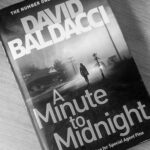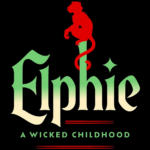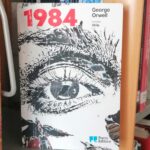The blood-soaked image of Nazi Germany first comes to my mind when I hear about this heartbreaking book. Behind the yellowed pages lies the rise of Nazism, the beginning of the German conquest of the world, and unfortunately, the horrors of the Second World War. ‘The Book Thief’ is a novel by Australian author Markus Zusak, was written in 2005. The book reminds us that even in a world filled with cruelty, there is a place for hope, art and humanity. This story is about not losing oneself amidst the chaos, finding a source of strength rather than breaking down.
“*** A Small But Noteworthy Note*** I’ve seen so many young men over the years who think they’re running at other young men. They are not. They are running at me.” ― Death, «The Book Thief»
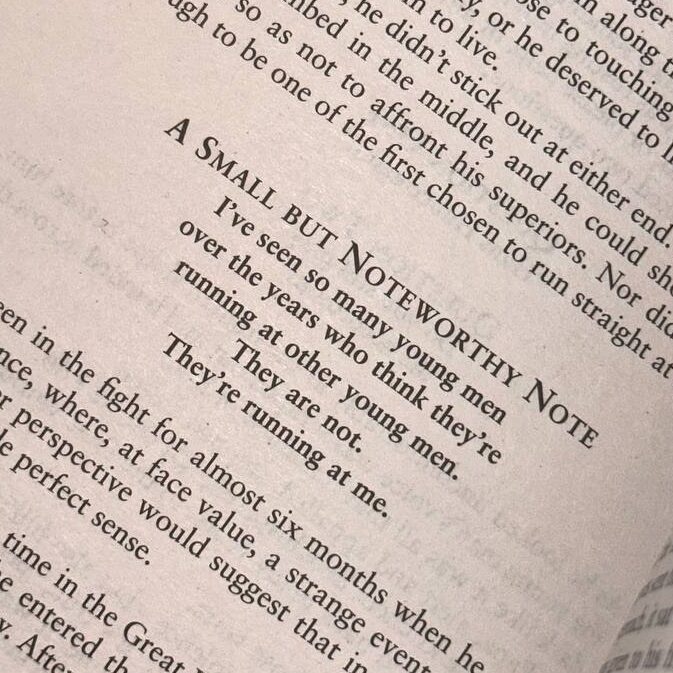
PART I: Synopsis
The story is set in Germany, January 1939. Beginning of the Second World War… The protagonist of this novel is nine-year-old Liesel Meminger, who has a truly difficult fate. Her father, associated with the Communists, is missing, and her mother, unable to care for the girl and her brother, decides to give the children to foster parents. Because she wanted to save them from persecution by the Nazi authorities. On the way to her new home, Liesel’s brother dies in front of the her eyes, leaving a heavy impression on girl’s life. She arrives in the author’s fictional town, Molching, to her new foster parents, Hans and Rosa Hubermann (they work as a house painter and laundress), who live on Himmel Street. And her story will start in this little town.
“In the Summer of 1942, the town of Molching was preparing for the inevitable. There were still people who refused to believe that this small town on Munich’s outskirts could be a target, but the majority of the population was well aware it was not a question of if, but when.”
The Book Thief , Markus Zusak
PART II: REVIEW
Mostly the story develops slowly due to the ordinary life of the people. All actions are occurred in this small town. Hans teaches Liesel to read, sparking her love for books, which becomes a source of comfort and escape. A young girl befriends her neighbor, Rudy, and they share adventures, including stealing books and food.
The Hubermanns hide Max, a Jewish man, in their basement, and Liesel forms a deep bond with him, sharing stories and dreams. As the war intensifies, the town faces air raids, and tragedy strikes when Molching. Liesel survives because she was in the basement writing her story.
The book ends with Death reflecting on Liesel’s long life, marked by love, loss, and resilience, showing the enduring power of words and the human spirit.
But you’ll know more below from the characteristics of each character and how they influenced the girl’s perception of the world.
An important moment in the book!
I liked the fact that the book changes subjective opinions about Germans. Many people hate all the people in Germany during the war. The book really breaks stereotypes about the Germans of the 1930s-1940s, showing that not all the inhabitants of Nazi Germany were supporters of the brutal regime.
The author reveals the daily lives of ordinary people facing poverty, fear, and moral choices. The story opens one’s eyes to the hardships and suffering of people and helps to develop a more objective perception of reality. Markus Zusak describes the harsh time of poor German families, namely the lack of food, work, and resources.
This makes the reader think about the fact that many of them lived in poverty and also suffered from war and repression. The merciless war had a bad effect not only on Jews or other nationalities, but also on the masses of ordinary German people. But while German families fled the dangerous bombs from the sky by hiding in cellars, using them as bomb shelters, the situation of the Jews was much worse. It is a sad to see the dashed hopes and faded dreams of millions of innocent people. We can see it from these lines:
“In the uneven circle, the minutes soaked by. Liesel held Rudy’s hand, and her mama’s. Only one thought saddened her. Max. How would Max survive if the bombs arrived on Himmel Street?”
The Book Thief
How are the characters described?
The characters in the book are deeply developed and multi-layered. Each of them has their own history and internal conflicts.
Liesel Meminger
The main character of the book is shown in a multifaceted way. Her character is revealed gradually through events and interactions with others. At the beginning of the book, she suffers a tragedy, but as time goes on, she begins to find the strength to fight back. Her progressive growth and ability to cope with difficulties demonstrates her resilience.
I also want to point out that Liesel uses books as a tool against Nazi propaganda. Reading fascinates her and she steals books as she has none of her own, so she becomes a real ‘book thief’. I think it symbolizes in some ways the struggle against the suppression of culture and free speech. She finds comfort and strength because of the books to overcome the horrors that are happening around her. She is like a symbol of hope despite all the dark realities of war.
However, I believe that not all aspects of Liesel’s personality are fully revealed. We see her through the prism of events and much is left unsolved, such as how she will act as an adult and how she coped with life after the war. This creates a sense of understatement and one is left wondering how she lived into old age. Therefore, I liked the reveal of Liesel’s personality, but there are flaws here that make it hard to see the full picture.
Death
The story is told on behalf of ‘Death’. While reading it, I wondered if it was possible that Death has a heart bigger than a human being? He lifts the suffering souls of dead people from their bodies. He connects two different worlds by wandering through both.
‘They say war is death’s best friend, but I should offer you a different perspective. War to me is like a new boss who demands the impossible. He stands behind you and keeps repeating one thing: ‘Do it, do it…’’ And you work hard. You do it. The boss, however, does not thank you. He demands more.’
Death’s perspective, The Book Thief
Death actually narrates the story, adds another layer of philosophical insight. It is not just an abstract figure, but an individual who observes human suffering. The death is an inevitable and often merciless. In this context he becomes a character who reminds readers about the value of life.
Hans Hubermann
He is a character who embodies generosity and protection. His ability to be humane and care for Liesel in the face of war is a key trait of his nature. I think he represents the ideal of a moral compass in an environment where many were forced to submit to a cruel system.
Hans notices Liesel’s struggles with literacy and helps to her learn to read. He spends nights for teaching her to read and write, using the books she has. This builds a bond between them and reflects his patience and care.
He is a really good father. Because after Liesel’s traumatic experiences, he stays with her during the night, until she falls asleep, plays music by accordion to comfort his daughter and make her feel safe and he always makes sure she feels secure, especially during scary times like air raids.
Also, he is a person who respects the principles of moral. Hans takes risks by hiding Max in their basement. By involving Liesel in protecting Max, he tries to teach her compassion and courage.
Rosa Huberman
She is a strict and sometimes harsh woman, but she is also full of love and caring. Despite her harshness, she is actually supportive of Liesel and others. Rosa is an example of how love and care can be shown in the most difficult forms, she shares love to others in a way we are not used to.
Rosa how I mentioned, may seem tough, but she cooks for Liesel and makes sure she’s taken care of. When Liesel is upset or scared, she comforts her, even though she doesn’t show her feelings openly. Rosa, despite her gruff exterior, ensures Liesel has food, shelter, and a sense of normalcy. I remember that she shows softer moments, such as when she hugs daughter after Max becomes ill, revealing her deep care.
She uses her stern attitude as a protective mechanism but genuinely loves and protects Liesel, even when the situation becomes dire.
Rudy Steiner
He is a neighborhood boy who becomes Liesel’s best friend and first love. Rudy himself admires the great sprinter Jesse Owens, a dark-skinned athlete who shattered Nazi theories about the superiority of the white Aryan race and won four gold medals at the Berlin Olympics. In an innocent act of rebellion, he once painted himself black with charcoal and ran a race, showing his defiance of Nazi racial ideology.
He is a bright and charming personality. And he has optimism, courage often contrast with the cruelty of the world. His affection and attitude towards Liesel emphasizes the purity of his heart. Of course, Rudy is fiercely loyal to Liesel, standing by her side no matter the circumstances. He’s willing to take risks, like stealing food to help his family and friends survive during tough times.
Rudy’s love for Liesel is evident through his actions, like helping her deliver laundry, defending her from bullies, and being there for her in times of need. I find his selflessness make him a standout character.
Max Vandenburg
A Jew who has temporarily settled with the Hubermans, is a character who epitomizes resilience and sacrifice. In the past, Max’s father saved Hans’s life during the First World War, and the latter sees fit to repay his dead comrade by saving his son. Max and Liesel became true friends, and he gave Liesel an illustrated book in which he shares his innermost thoughts with her. He had just one book, so by his decision it was painted first to the white, then letters and story appeared on the pages. The book was ‘Mein Kampf’ of the Hitler.
His relationship with Liesel becomes an important moment in the development of her personality. Max inspires a little girl to understand what love, resilience, fighting the system are, and to find strength in words and books.
“You could argue that Liesel Meminger had it easy. She did have it easy compared to Max Vandenburg. Certainly her brother practically died in her arms. Her mother had abandoned her. But anything was better than being a Jew.”
The Book Thief
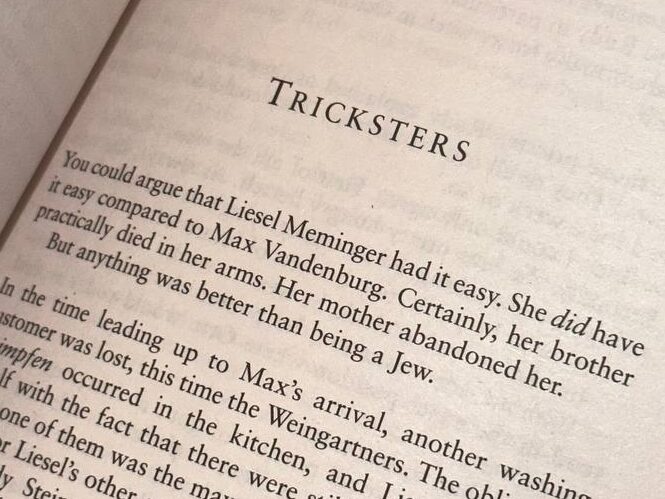
PART III: Conclusion
The symbol of humanity
First of all, what we can learn from this book is to appreciate life, to understand the importance of peace and harmony, not to lose the moral qualities that make us human. Morality and humanity distinguish us from animals. People support each other in difficult situations, the strong person helps so that the weak can get up and live on.
The Hubermans, who are Liesel’s adoptive parents, epitomize goodness and compassion. Despite great danger, they shelter the Jewish man, Max, which emphasizes, even amongst the Germans there were people willing to risk their lives for the sake of humanity. I consider it courageous to go against your nation in the name of justice and morality, to give your last piece of bread to Jews when hunger strikes you, to let a strange girl read books from your library to make her life a little brighter. Humanity is shown in brutal conditions.
Especially, Liesel is trying to help Max in every possible way, for example, she brings both snow and clouds to the man who has not seen the light for a long time.
“When she returned to the basement, she told him. “The sky is blue today Max, and there is a big long cloud, and it’s stretched out like a rope. At the end of it, the sun is like a hole…’” – The Book Thief
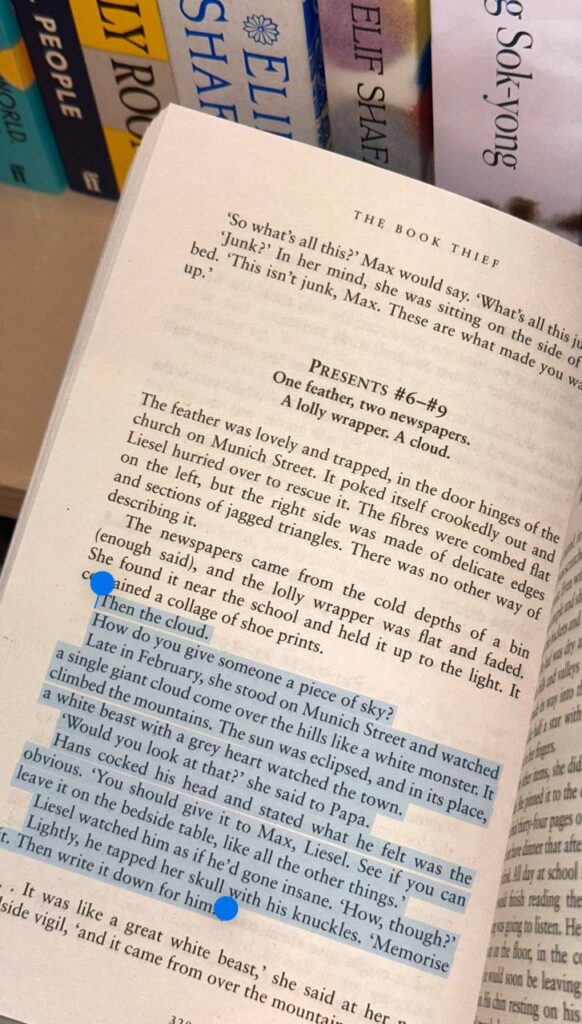
“After delivering the first handfuls of snow, Liesel checked that no one else was outside, then proceeded to take as many buckets and pots out as she could. She filled them with the mounds of snow and ice that blanketed the small strip of world that was Himmel Street. Once they were full, she brought them in and carried them down to the basement,” – The Book Thief
Liesel and her family try to resist the propaganda, they find solace in literature and individual thinking, comparing this to mass ideology. Liesel herself steals books, which symbolizes in some ways the struggle against the suppression of culture and free speech. This book teaches that every nation has villains as well as heroes, and most people remain hostage to circumstances. It shatters the black and white picture of perception and reminds us that war brings suffering to everyone, regardless of side.
To be honest, it affected me a lot. It’s not only about integrity and human morality, but also about becoming a person. In the development of the plot, I see how the characters changed, they were not always so generous from their birth, but in hard time people help each other, which makes us humane. Markus Zusak describes it:
“The road was cold and straight. It wasn’t long until the soldiers came with the Jews. In the tree shadows Liesel watched the boy. How things had changed from fruit stealer, to bread giver. His blonde hair, though darkening, was like a candle. She heard his stomach growl – and he was giving people bread.”
The Book Thief
What does it means to be a human?
Secondly, it is crucial to not lose yourself in any way. We can fight for our future, it is not about to start new war to end the previous one. Because conflicts are not the answer that we are searching for. Killing people is illegal, all people have rights to life and liberty. In the past thousands of years ago, it started because of those cultural values and accepted norms that generalized jousting. For example, in the Mongol Empire, people killed others to show strength and dignity. But since then, a lot has changed.
If I had the opportunity to kill Hitler, I wouldn’t do it. Why? We know that he and his orders hurt millions of people and there were numerous holocausts. But I don’t think killing a person because he killed others is the key of being human. How am I supposed to be better after it? What would be our difference? Killing one person or a thousand people, still amounts to a violation of human rights and the law. I would send him to prison for a lifetime of hard labor with no human contact, after talking to psychologists beforehand, because I would like to see him repent. However, I think this is highly unlikely, so solitude would be better for him, because it kills spiritually as well.
In the XXI century, when we are developed really well in a lot of main fields, it’s stupid making a bloody rallies and clashes. Unfortunately, it still happens in the whole world. We need healthy competition in the information space, education, sustainable development in all spheres, advanced medicine, tourism, but not war.
The power of words
Thirdly, I realized that the ‘Words’ are powerful. Words can both destroy and save. Nazi propaganda used words to control and manipulate the population. Over a thousand people followed Hitler, the mastermind behind the massacre. I am not spilling dirt on all the people, some willingly agreed to the leader’s tactics and trusted him wholeheartedly, and others were forced to comply because they were thinking of their families. Clearly, there was a lot of pressure from the authorities and society. Some are forced to submit to the Nazi regime out of fear for their families. For example, Liesel’s neighbors participate in public events such as book burning, not because they believe in Nazi ideas, but to avoid suspicion. In turn, little Liesel found freedom in her fantasies, hope and support in reading books. It was the words from books that gave her food for thought and became a source of deep understanding of various topics. Life is not perfect, it is not entirely made up of evil or good, hate or love, cruelty or compassion, violence or humanity. Life is the sum total of everything good and bad, and all people commit sins. But far superior is the person who values morality and humanity even in the darkest of times.
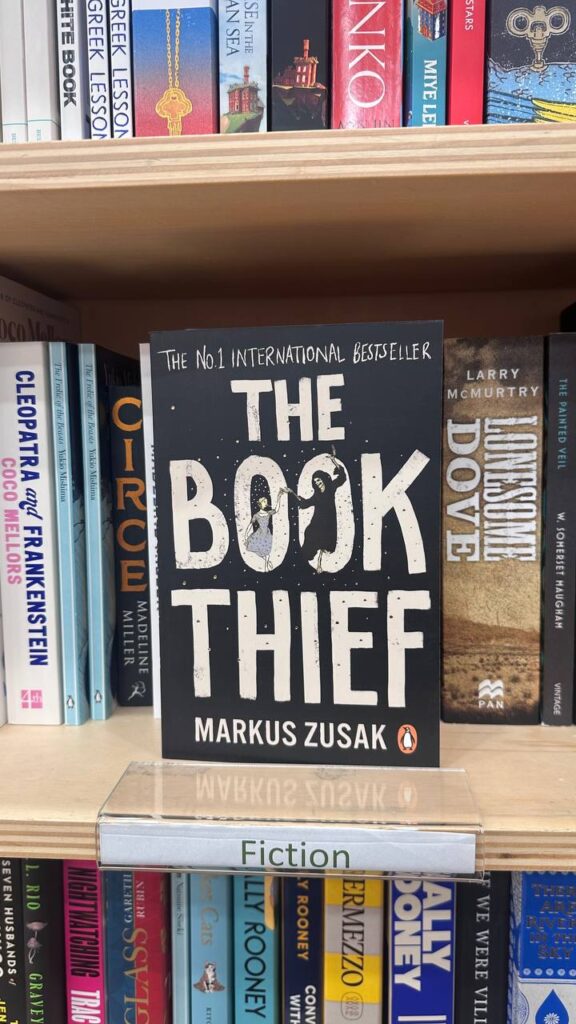
People always see the world through their own prism and perceive differently. There is nothing good about war, both sides lose, innocents die, there are always casualties. War and malicious killing cannot be justified.
‘The snowflakes of ash were circling with such charm that it was tempting to catch them with one’s tongue out, to taste them. But those snowflakes would scorch the lips. They would have burned my mouth.’
It is impossible to look optimistically at war, but it is possible to remember to be hopeful. Liesel was able to find solace amidst the raging war. Through Liesel and her family, I apparently see, even in the worst of times, people are capable of kindness, love, and compassion. Liesel’s relationships with her foster parents, her best friend Rudy, and the sheltering Jew Max show how love and support help her survive the brutal conditions.
The reason for the name ‘The Book Thief’ came from deep love to the books. A book is a best friend, an inexhaustible treasure and a beacon in the darkness for young children like Liesel. Exactly, it is the book that intimately links her past life and the beginning in her new family. The only way to provide peace of mind during the war was to give the girl a book written in black ink on these once white pages.
